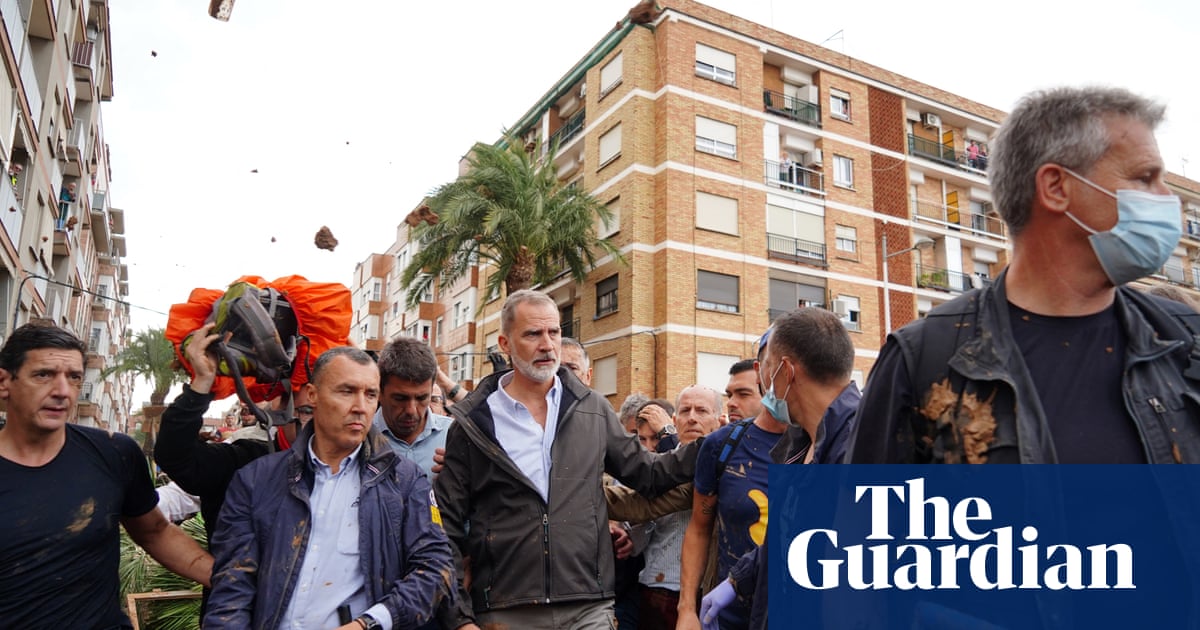Hundreds of people have heckled Spain’s King Felipe and Queen Letizia, as well as the prime minister and the regional leader of Valencia – throwing mud and shouting “murderers” – as the group attempted an official visit to one of the municipalities hardest hit by the deadly floods.
The scenes playing out in Paiporta on Sunday laid bare the mounting sense of abandonment among the devastated areas and the lingering anger over why an alert urging residents not to leave home on Tuesday was sent after the floods began surging.
The official visit came as the death toll climbed to 214 and mayors from the affected municipalities pleaded with officials to send help.
“We’re very angry and we’re devastated,” said Guillermo Luján, the mayor of Aldaia. “We have a town in ruins. We need to start over and I’m begging for help. Please help us.”
The town’s 33,000 residents were among many in the region grappling with the aftermath of the ferocious floods that rank as the deadliest in Spain’s modern history. At least 214 people have been killed, almost all of them in the region of Valencia, while the number of missing remains unknown.
Luján said his town was in desperate need of heavy machinery to clear out the vehicles and debris piled up along the streets.
The municipality had yet to confirm the extent of the devastation, leaving Luján bracing for the worst. Aldaia has one of the region’s most visited shopping centres, with a vast underground car park that on Tuesday filled with water in a matter of minutes.
“Right now, the upper part of the centre is devastated and the lower level is a terrifying unknown,” Luján told broadcaster RTVE. “We don’t know what we’re going to find. We want to be cautious, but we’ll see. It might be heartbreaking.”
In Paiporta, one of the towns most affected by the floods, the mayor, Maribel Albalat, described the situation as desperate. Days after the town’s ravine overflowed, unleashing a deluge of water that wreaked havoc on the 29,000 inhabitants, parts of the town remain inaccessible, she said. “It’s impossible because there are bodies, there are vehicles with bodies and these have to be removed,” she told the news agency Europa Press. “Everything is very difficult.”
Albalat said the number of deaths had climbed to 70 in the small town and was expected to climb in the coming days, as access was secured to underground garages. On Tuesday, in the absence of any sign that this storm would be different from any other, many residents had gone down to their garages move their cars to higher ground.
In flooded towns such as Alfafar and Sedaví, mayors described feeling abandoned by officials as residents scrambled to shovel mud from their homes and clear streets. In some areas, residents were still trying to secure electricity supply or stable phone service.
On Friday, the catastrophic images emanating from these municipalities coalesced into a show of solidarity, as thousands of volunteers from lesser-affected areas trekked to the hardest-hit areas carrying shovels, brooms and food supplies. On Saturday, thousands more turned up at Valencia’s City of Arts and Sciences, which had been hastily converted into the nerve centre of the clean-up operation.
The mayor of Chiva, where on Tuesday nearly a year’s worth of rain fell in eight hours, said the situation was a “rollercoaster” for the 17,000 residents.
“You see sadness, which is logical given that we’ve lost our town,” Amparo Fort told reporters. “But on the other hand, it’s heartening to see the response that we’ve had from everyone … there is a real, human wave of volunteers, particularly young people.”
after newsletter promotion
Her remarks came as Spain’s prime minister, Pedro Sánchez, said 10,000 troops and police would be deployed to help with what he described as “the worst flood our continent has seen so far this century”.
He acknowledged that help had been slow in reaching where it was most needed. “I’m aware that the response we’re mounting isn’t enough. I know that,” he said. “And I know there are severe problems and shortages and that there are still collapsed services and towns buried by the mud where people are desperately looking for their relatives, and people who can’t get into their homes, and houses that have been buried or destroyed by mud. I know we have to do better and give it our all.”
The intense rain has been attributed to the gota fría or “cold drop” phenomenon, which occurs when cold air moves over the warm waters of the Mediterranean, creating atmospheric instability that causes warm, saturated air to rise rapidly, leading to heavy rain and thunderstorms.
Scientists say the human-driven climate crisis is increasing the length, frequency and intensity of extreme weather events. The warming of the Mediterranean, which increases water evaporation, plays a key role in making torrential rains more severe, experts have also said.
The official visit came as questions continue over why the alert warning people to stay in their homes was sent out only after the water levels began to rise.
The meteorological agency launched a red alert for the Valencia region on Tuesday morning, keeping it active as conditions deteriorated throughout the day. But it took until after 8pm for the civil protection service, which is overseen by the regional government, to send an alert urging residents not to leave home. For some, the warning sounded as they were already up to their necks in water.
In some of the hardest-hit areas, residents linked the delay to the death toll. “If they had warned us, these deaths would not have happened,” Laura Villaescusa, a resident of La Torre, told Reuters earlier this week. “The deaths we have now could have been avoided.”

